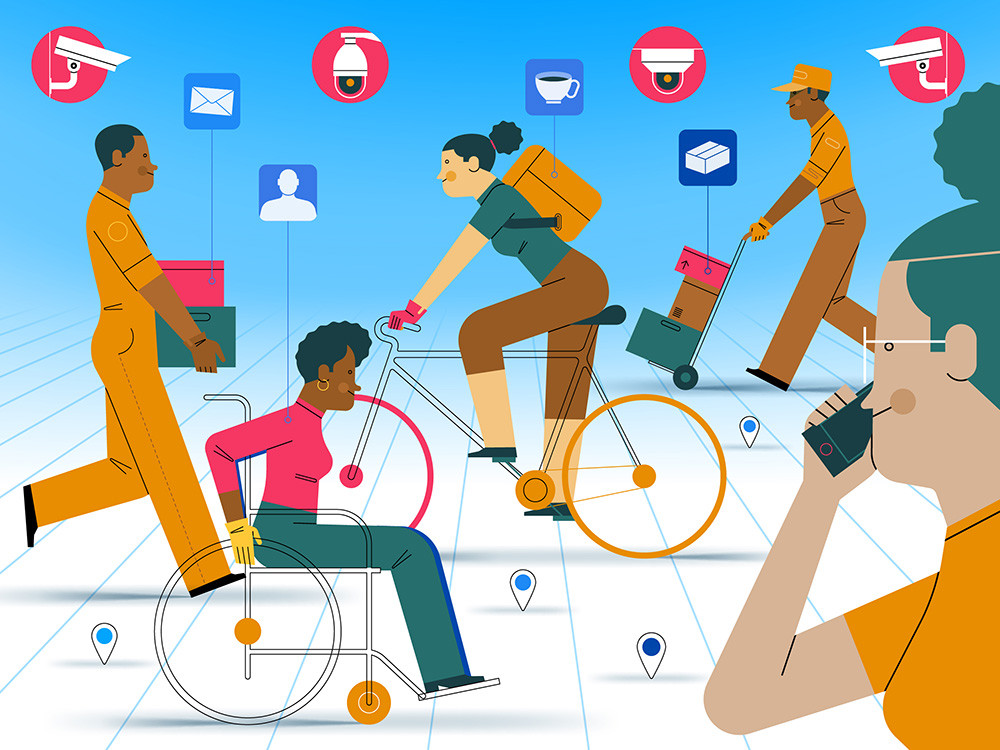 (Illustration by Hugo Herrera)
(Illustration by Hugo Herrera)
In 2018, a California house cleaner named Patricia Cris arrived for an appointment to clean an apartment in San Jose. No one was supposed to be home and she’d been given a key to get in. But when she knocked to announce herself, she told The New York Times, a completely naked man answered the door, as though he’d been waiting for her. Scared to enter, Cris canceled the appointment and messaged the company she worked for. But, she says, instead of addressing an egregious incident of sexual harassment, or even checking to see if Cris was okay, the company fined her $15 for leaving a booking before the job was complete.
In many contexts the story might be hard to believe: a flagrant violation of employers’ obligation to protect employees from discrimination, including sexual harassment. But according to the company Cris worked for—the online home services booking app Handy, which is commonly referred to as “Uber for maids”—Cris wasn’t an employee, but an independent contractor in the ever-expanding world of gig work. And that made all the difference.

The United States is home to more gig firms than anywhere in the world, with apps for food delivery, dog walking, haircuts, babysitters, warehouse temp workers, and much more. While people tend to equate gig work with ride-hailing apps like Uber and Lyft, the platform economy is expanding to cover more and more aspects of daily life, including a proliferating sector of home services like cleaning, “handyman” jobs, and “Uber for family” care work.
From their inception, the employment model of most gig platforms has claimed to offer a trade-off, wherein workers don’t receive the benefits and stability of traditional employment but enjoy the autonomy and flexibility of setting their own schedules and working for themselves, casting Uber’s fleet of drivers or DoorDash’s battalion of food deliveristas as independent entrepreneurs. But the tradeoff has never been fair and the platforms increasingly seek to have it both ways.
Much of the issue comes down to the question of worker classification. In the United States, traditional employees enjoy (on paper at least) the right to sick time, a minimum wage, a union, and other employee protections from dangerous conditions and abuse. The model is premised on the bargain that if employers want to control how workers do their jobs—dictating their schedule, working conditions and pay—they must also take responsibility for workers’ well-being. Independent contractors, by contrast, have none of those rights, but are presumed to have equal contractual standing as the entity hiring them. In reality, they assume much more risk. In theory, this supposed exchange is meant to afford them more control over the terms of their work.
Gig companies like Uber and Handy, however, are having their cake and eating it too: fully controlling workers’ pay and conditions while evading the cost of doing business, like paying for unemployment insurance and workers’ comp (then using the money they save to pad their own profits). Within that system, platform workers are suffering in numerous ways.
In many platform gigs, workers receive piecemeal wages—not an hourly wage but a set rate per delivery or booking—that often leave them unable to predict their income or working longer hours for no extra pay. Many pay out of pocket to cover the cost of doing their jobs, from business supplies to equipment. Many are also subjected to various forms of wage theft or discrimination, often aided by algorithms, as companies collect extensive data on workers and use it to control which jobs they can take. On some platforms, workers face automatic penalties for canceling jobs over reasons protected by law in traditional employment. We’ve heard from workers who were charged cancellation fees for getting sick with COVID or for having to leave a job when their spouse went into labor. And after fees and penalties are deducted from paychecks, workers often make sub-minimum wages.
In response to issues like these, the research project Fairwork, coordinated by the Oxford Internet Institute and WZB Berlin Social Science Center, created a 10-point rating system to assess how platform companies treat workers. Drawing on worker interviews, public documents and, where possible, discussions with company leaders, Fairwork grades platform corporations according to five metrics: fair pay, fair conditions, fair contracts, fair management and fair representation. To date, this initiative has assessed companies in close to 40 countries, and revealed successes in changing platforms’ contracting policies—for example, convincing companies to translate contracts into workers’ primary languages—and increasing dialogue with workers to address their concerns.
In August, Fairwork released its first report on the United States, covering 13 of its largest digital labor platforms, from rideshare apps to warehouse temping. While there are variations, the takeaway is that none of these platforms are doing enough to guarantee minimum thresholds of fair work for the people making their companies run, and that conditions for US platform workers are falling significantly below global standards.
Still, some scored better than others. Three of the assessed companies received a rating of 2 out of 10: the rideshare company Alto and warehousing temp platform Bluecrew, which both hire their workers as full employees, and the elder-care platform Papa, which through dialogue with Fairwork was able to demonstrate that they have instituted some policies to improve working conditions. Workers at Alto and Bluecrew, though employees, reported appreciating freedom on the job and flexibility with regard to their schedules. All other 10 corporations, including Handy, were rated 0.
But a few additional problems became clear in the US platforms we studied. First, workers across numerous sectors fear encountering gun violence on the job (a condition unique to the United States). Second, US gig work has a clear racial component, since not only are most platform workers people of color but race also impacts their experience working on the apps, and workers of color tend to be more dependent on the app as well. Finally, we found that thanks to algorithmic management, many workers lack any meaningful access to human intervention when crises arise.
That’s certainly the case at Handy, and is a key reason why, several years ago, the Public Rights Project (PRP) began working to address labor abuses there. As a civil rights organization, PRP’s mission is to ensure that gig platforms are held accountable to their legal obligations, seeking to close the gap between what the law provides and what workers actually experience.
We were helped by the fact that in 2019, California passed a law barring the misclassification of workers. According to Assembly Bill 5 (AB5), platforms cannot claim workers are independent contractors if their jobs constitute the core of the company’s business and if companies control the circumstances of workers’ labor. Domestic services platforms have been particularly bad at complying with this standard. But even within that sector, Handy stood out for the ways it sought to have it both ways: strictly controlling workers while evading all responsibility for those workers’ well-being.
When speaking with 25 current and former Handy workers, almost half recounted experiences of sexual harassment like Patricia Cris’s. One worker said they had a client ask her to wear revealing clothes to her next appointment, but when she reported it to Handy, the company said they had “no control over what their clients wanted and it was up to [her] to decide what was acceptable.” Another worker reported being propositioned for sex work by a client, who subsequently threatened to withhold his pay if he called the police; when the worker told Handy, he says the company asked for proof then did nothing to follow up.
Handy’s policies enabled this abuse, including through its system of penalizing workers for leaving jobs without client approval, as well as its customer rating system, which is used to determine both workers’ pay and their continuing employment, since workers whose customer ratings drop below 4.3 are reportedly terminated from the platform. The company also offers workers almost no means of reaching human managers, since all communication between workers and the company is electronic, and often handled by automated bots. Within this system, workers worry constantly about fines. One recounted a situation in which a client scheduled a last-minute booking that the worker hadn’t seen, and when they didn’t show up, Handy fined them $50 and canceled their next two days of appointments. Likewise, a Handy worker in Detroit had the police called on her by neighbors after a customer entered their address wrong and Handy said they would not pay her unless she stayed at the location for 30 minutes.
Because the majority of Handy’s business is conducted in California, in 2020 PRP took these concerns to the state’s Department of Fair Employment and Housing, asking the agency to investigate the company for how its systematic misclassification of workers had enabled a wide range of abuses. The following year, the district attorneys of Los Angeles and San Francisco filed a joint lawsuit against the company for violating AB5. This May, that lawsuit led to a landmark settlement, with Handy agreeing to pay $6 million, the vast majority of which will go towards restitution payments for more than 25,000 workers. Going forward, Handy must also allow workers to negotiate their own terms and fees with clients, and not penalize them for rejecting jobs.
The settlement effectively forced Handy to pick a lane that complies with the law: either pay and treat their workers as employees or grant them the control that truly independent contractors have. As such, the case offers a model for how state and local governments can hold tech companies accountable—a particularly important ability given the domestic services platform economy is projected to grow into the trillions of dollars as tech giants like Amazon, Google, and Facebook enter the market.
As the Fairwork research shows, other, fairer models of platform work are possible. But allowing platforms to operate without targeted regulation simply isn’t working. Too many companies feel no compulsion to treat workers fairly and those that do find it hard to compete against platforms that pay next to nothing for labor. That means policy and enforcement changes are needed, at both the state and federal level.
Fixing the problem of worker misclassification is an important first step, but it’s not a panacea. We need to both articulate a vision of what a better gig economy looks like, and scale the sort of enforcement that the Handy case represents. To that end, PRP is working with state governments around the country to take action against other companies manipulating and flouting the law. Groups like Fairwork are working to expose the alarming gap between working conditions on digital labor platforms and minimum global standards for equitable labor, sending a clear message to policy makers and civil society. The Fairwork Pledge also asks businesses, government entities, schools, charities and more to sign on in support of its ratings systems and to commit to make meaningful changes in their own workplaces.
In the meantime, there’s also a role for the rest of us, whose lives are made easier by the convenience of platform apps. It’s incumbent on the public to make clear to those companies that we won’t support businesses that don’t support their workers.
How do we make sure businesses continue to create high-quality jobs and safe, fair working conditions? Listen to the discussion from SSIR’s 2023 Data on Purpose conference:
Support SSIR’s coverage of cross-sector solutions to global challenges.
Help us further the reach of innovative ideas. Donate today.
Read more stories by Jill Habig, Veena Dubal & Mishal Khan.

